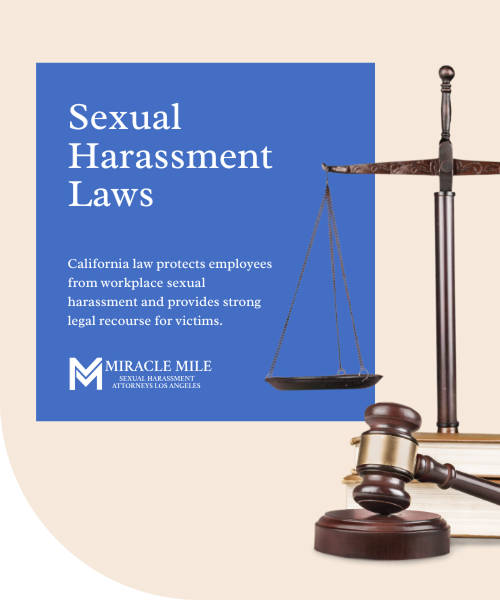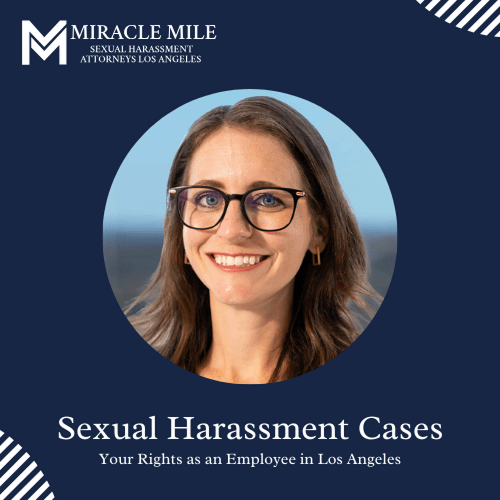California Sexual Harassment Laws: What Employees Need to Know
California has some of the strongest workplace protections against sexual harassment in the nation. Employees and independent contractors have legal rights under state and federal laws that prohibit harassment and hold employers accountable. If you have experienced sexual harassment at work, understanding your rights is the first step toward justice. At Miracle Mile Law Group, our Los Angeles attorneys represent employees who have been subjected to workplace harassment, retaliation, and discrimination.
Understanding Your Case

Miracle Mile Law Group California Sexual Harassment Laws & Protections: Caitlyn Handy, Esq.
“California has some of the strongest workplace protections against sexual harassment, and every employee has the right to a safe and respectful work environment. At Miracle Mile Law Group, we fight to enforce these protections and hold employers accountable.”
Workplace Sexual Harassment California Laws
California law provides strong protections for employees facing quid pro quo harassment, hostile work environments, and retaliation for reporting misconduct. The Fair Employment and Housing Act (FEHA) and other key laws establish strict legal standards for what constitutes unlawful sexual harassment and define employer responsibilities.
Key California Laws Protecting Employees from Sexual Harassment
Fair Employment and Housing Act (FEHA)
FEHA is California’s primary anti-discrimination and harassment law, offering broader protections than federal law.
- Covers all workplaces with at least one employee or independent contractor.
- Prohibits workplace sexual harassment by supervisors, coworkers, and third parties.
- Holds employers strictly liable if a supervisor sexually harasses an employee.
- Requires employers to take immediate corrective action when harassment occurs.
Employers must have clear anti-harassment policies, conduct training, and take proactive steps to prevent harassment. Failure to act can result in serious legal consequences.
California Civil Rights Department (CRD) Regulations
The California Civil Rights Department (CRD) is responsible for enforcing workplace harassment laws and investigating complaints.
- Employees can file a complaint with the CRD to seek legal remedies.
- The CRD was formerly known as the Department of Fair Employment and Housing (DFEH).
- Employers must comply with CRD regulations to prevent workplace harassment.
Senate Bill 1343 (SB 1343) – Sexual Harassment Training Requirements
To reduce workplace harassment, California mandates sexual harassment prevention training for employees.
- Employers with five or more employees must provide training every two years.
- Supervisors must receive two hours of training, while non-supervisory employees must receive one hour.
- Training must include education on identifying and reporting harassment.
California Labor Code 1102.5 – Whistleblower Protections
- Protects employees from retaliation when reporting sexual harassment or illegal activity.
- Covers both internal complaints (to HR or management) and external complaints to government agencies.
California Constitution, Article I, Section 8
- Ensures equal employment rights and prohibits discrimination based on sex, gender identity, or sexual orientation.
- Strengthens workplace protections beyond federal law.
Legal Protections for Employees in Los Angeles
Employees in Los Angeles and throughout California have strong legal protections against workplace sexual harassment and retaliation. Under state and federal law, workers are entitled to a safe and respectful work environment and have multiple legal options to take action if they experience harassment. Employers are required to prevent, investigate, and address harassment in the workplace; failure to do so can result in serious legal consequences.
Sexual harassment can take many forms, including quid pro quo harassment, a hostile work environment, unwanted, verbal harassment, digital harassment, and retaliation for reporting misconduct. Employees who face such treatment have the right to report it without fear of punishment and may be eligible for financial compensation, reinstatement, and other legal remedies.
Key Employee Rights Under California Law
Employees in Los Angeles are protected under the California Fair Employment and Housing Act (FEHA), the Civil Rights Department (CRD), and federal laws such as Title VII of the Civil Rights Act. These laws prohibit harassment and provide avenues for legal action against employers who fail to address workplace misconduct.
- The Right to File a Complaint:
- Employees can file a formal complaint with the California Civil Rights Department (CRD) or Equal Employment Opportunity Commission (EEOC) if they experience workplace harassment.
- Complaints must be filed within a certain timeframe (usually three years for CRD and 180–300 days for EEOC) to preserve legal rights
- Protection from Employer Retaliation or Wrongful Termination:
- It is illegal for an employer to fire, demote, punish, or discipline an employee for reporting sexual harassment.
- Retaliation includes cutting work hours, changing schedules unfairly, increasing workload, or creating a hostile work environment to force an employee to quit.
- The Right to Compensation:
- Employees subjected to sexual harassment or retaliation may be entitled to financial compensation for:
- Emotional distress, anxiety, or mental health impacts.
- Lost wages and benefits due to wrongful termination or retaliation.
- Medical expenses related to therapy or counseling needed due to the harassment.
- Punitive damages if the employer’s misconduct was extreme or intentional.
- Employees subjected to sexual harassment or retaliation may be entitled to financial compensation for:
- The Right to Report Harassment Without Fear:
- Employees are legally protected from employer or coworker retaliation for filing a complaint, testifying in a harassment case, or supporting a colleague’s claim.
- California law also requires employers to protect employees from retaliation by managers, supervisors, and coworkers.
- Employer Responsibility to Take Immediate Action:
- Employers must have clear anti-harassment policies in place, provide sexual harassment prevention training, and immediately investigate all complaints.
- If an employer ignores complaints or fails to act, they can be held legally responsible and forced to pay damages to the victim.
Holding Employers Liable for Failing to Stop Harassment
Employers in Los Angeles who fail to prevent, investigate, or correct sexual harassment can be held legally liable. Employees who experience harassment should document all incidents, keep records of complaints made to HR, and seek legal advice from a qualified attorney.
If an employer refuses to take action, the employee may have grounds to file a lawsuit for damages, including compensation for:
- Lost earnings and benefits from wrongful termination.
- Career setbacks and lost professional opportunities due to workplace harassment.
- Emotional suffering, PTSD, or distress caused by a toxic work environment.
- Legal costs and attorney’s fees.
Legal Protections for Independent Contractors in Los Angeles
California has some of the strongest workplace protections in the country, extending sexual harassment protections to independent contractors, freelancers, and gig workers, a right that is not available in many other states. While federal laws, such as Title VII of the Civil Rights Act, do not apply to independent contractors, California’s Fair Employment and Housing Act (FEHA) ensures that non-employee workers still have legal recourse if they experience sexual harassment while performing their work.
Freelancers, independent contractors, and gig workers often rely on repeat clients, positive reviews, and word-of-mouth recommendations to sustain their careers. When sexual harassment occurs in a professional setting, it can not only create a hostile work environment but also jeopardize their ability to secure future contracts, disrupt their income, and force them out of their chosen industry. California law recognizes these risks and provides strong legal protections.
Independent Contractors’ Rights Under California Law
FEHA grants independent contractors legal protection against workplace sexual harassment, ensuring they have the right to report harassment and seek damages when necessary.
- FEHA explicitly prohibits sexual harassment against independent contractors.
- Applies to any workplace with at least one employee or independent contractor.
- Independent contractors have the right to report harassment without fear of retaliation or blacklisting.
- Non-employee workers can file legal claims against:
- Businesses or companies that hired them.
- Clients or third parties who engaged in harassment.
- Supervisors, managers, or others in positions of power who exploited their status.
Unlike traditional employees, independent contractors do not have access to employer HR departments and often lack internal company protections against harassment. California law compensates for this gap by giving non-employee workers the right to file complaints, pursue legal action, and recover damages.
Compensation for Independent Contractors Who Experience Harassment
Sexual harassment can severely impact an independent contractor’s ability to work by damaging professional reputation, career advancement, and income stability. California law allows victims to pursue compensation for these damages.
Potential Compensation for Independent Contractors Includes:
- Emotional Distress Damages:
- Compensation for anxiety, PTSD, humiliation, and psychological trauma caused by harassment.
- Covers therapy costs or other mental health treatment.
- Lost Income Due to Workplace Hostility:
- Compensation for missed job opportunities or lost contracts due to harassment or retaliation.
- Damages for being forced to leave a client or industry because of a hostile environment.
- Punitive Damages in Cases of Employer Negligence:
- Awarded when the hiring company or client knew about harassment but failed to take action.
- Designed to punish bad actors and prevent further violations.
Because the legal protections for independent contractors differ from full-time employees, it is crucial to consult with an attorney to determine the best course of action for seeking justice.
How Independent Contractors Can Take Legal Action
If you are an independent contractor, freelancer, or gig worker who has experienced sexual harassment while working, you have the right to take legal action in Los Angeles and throughout California. The first step is to document any incidents and seek legal guidance to determine the best course of action.
Steps to Protect Your Rights as an Independent Contractor:
- Document Everything:
- Keep records of inappropriate emails, texts, or interactions.
- Save any communications showing retaliation or blacklisting.
- Gather witness statements if possible.
- Report the Harassment:
- Even if you are not a full-time employee, you may still have reporting options within the company or client’s organization.
- File a formal complaint with the California Civil Rights Department (CRD) if necessary.
- Consult a Sexual Harassment Attorney:
- An experienced attorney can help independent contractors determine the best legal approach, whether through a settlement, lawsuit, or alternative legal action.
At Miracle Mile Law Group, we fight for independent contractors, freelancers, and gig workers who have suffered sexual harassment while on the job. Our attorneys understand the unique challenges faced by non-employee workers and are dedicated to holding businesses, clients, and hiring companies accountable.
Miracle Mile Law Group Attorneys for Employees in Los Angeles Facing Sexual Harassment
If you have experienced sexual harassment in the workplace, Miracle Mile Law Group is here to help. Our attorneys exclusively represent employees, never employers, and fight to hold companies accountable for workplace harassment.
Why Choose Our Los Angeles Sexual Harassment Attorneys?
- Dedicated Employee Representation: We only represent workers, never employers.
- Extensive Experience Handling Sexual Harassment Cases: We have helped countless employees obtain justice.
- No Upfront Fees – You Only Pay If We Win.
- Aggressive Legal Strategies: We fight for maximum compensation and employer accountability.
If you have been sexually harassed at work, you may be entitled to financial compensation and other legal remedies. Contact Miracle Mile Law Group today for a free consultation.


Our attorneys represent employees who have experienced workplace sexual harassment, including unwanted advances, inappropriate conduct, and retaliation for reporting misconduct. We fight to hold employers accountable and secure justice for victims through legal action.

Quid pro quo harassment happens when a supervisor or employer demands sexual favors in exchange for job benefits like promotions or raises. It is an abuse of power and illegal under California and federal law. Employees who face retaliation for refusing advances have the right to take legal action.

Employers are responsible for preventing and addressing workplace sexual harassment. They can be held liable if they ignore complaints or allow a hostile work environment. Failure to act can result in legal consequences and compensation for victims.

A hostile work environment happens when repeated harassment creates an intimidating or offensive workplace. This includes inappropriate comments, unwanted advances, or sexual jokes. Employers must prevent and address these conditions, and employees have the right to take legal action.
Work With a Top-Rated Los Angeles Sexual Harassment Attorney to Fight for Justice
- Experienced Trial Attorneys Who Win Cases: We are aggressive litigators prepared to take your case to court if your employer refuses to settle.
- Dedicated to Employee Rights in Los Angeles: We exclusively represent employees, never corporations, ensuring your best interests come first.
- No Upfront Fees and No Cost Unless We Win: We work on a contingency fee basis, meaning you pay nothing out of pocket, and we only get paid if we successfully win your case.
Free Consultation
Speak with an attorney. No fees unless we win.
Have Questions? Call us directly at (866) 395-6077 to speak with our sexual harassment attorneys
Free Consultations for Sexual Harassment Cases in Los Angeles
Contact Miracle Mile Law Group today to talk about your case with an experienced sexual harassment attorney.
